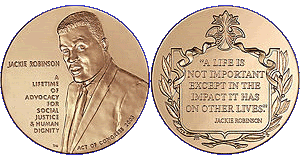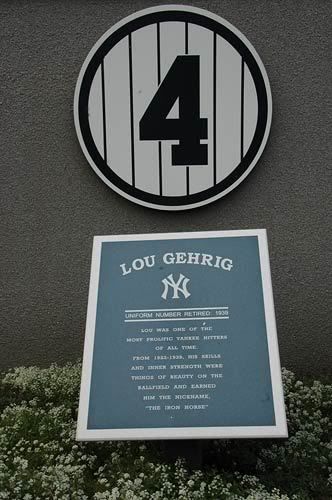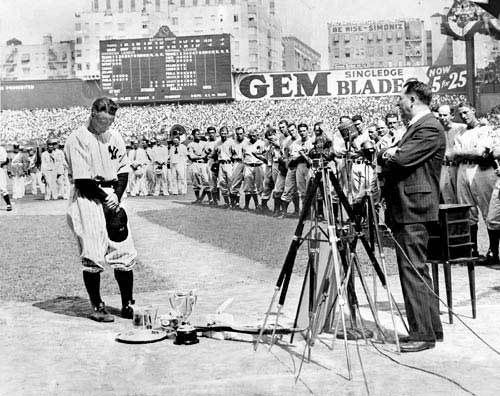"It kills me to lose. If I'm a troublemaker, and I don't think that my temper makes me one, then it's because I can't stand losing. That's the way I am about winning, all I ever wanted to do was finish first." Jackie Robinson
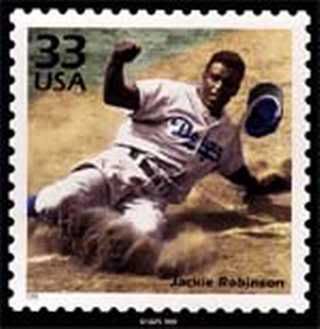 Robinson brought an energy and excitement to both the field of play that was only seen on the fields that the Negro Leagues baseball was played on. His determination on the field translated to a form of baseball that emphasized speed and aggressive baserunning that many of the fans of Major League baseball had not seen. Where Robinson was aggreesive on the field he was patient with the abuse that was hurled towards him from not only fans but from fellow players who often insulted him and threatened to not take the field if Robinson played in the game.
Robinson brought an energy and excitement to both the field of play that was only seen on the fields that the Negro Leagues baseball was played on. His determination on the field translated to a form of baseball that emphasized speed and aggressive baserunning that many of the fans of Major League baseball had not seen. Where Robinson was aggreesive on the field he was patient with the abuse that was hurled towards him from not only fans but from fellow players who often insulted him and threatened to not take the field if Robinson played in the game. "A life is not important except in the impact it has on other lives."Jackie Robinson
The significance of Robinson’s playing for the Dodgers was not only felt within the baseball ranks. In terms of society, Robinson would become one of the icons of the growing civil rights movement. As Buck O'Neill says in the documentary Pride and Preserverance: The Story of the Negro Leagues:
"Jackie Robinson, that was the beginning of the civil rights movement. That was before Brown vs. The Board of Education. That was before Sister Rosa Parks said 'I'm not going to move to the back of the bus today'. Martin Luther King was a sophomore at Spellman at the time. That's what got the ball moving."
Robinson’s playing of professional baseball, gave many young black men and women a positive role model. If Jackie could do it, why couldn’t they do it.
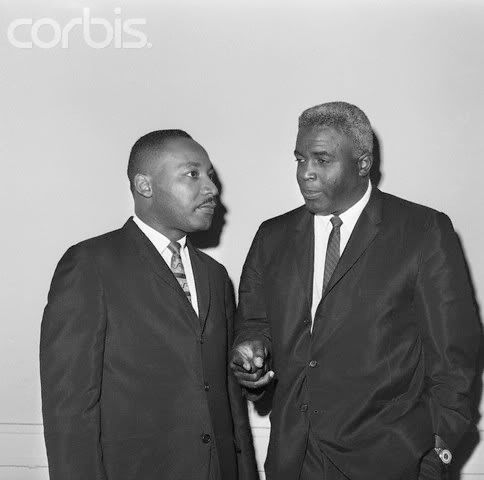 "The right of every American to first-class citizenship is the most important issue of our time." Jackie Robinson
"The right of every American to first-class citizenship is the most important issue of our time." Jackie RobinsonHis later life was devoted to the enhancement and advancement of the civil rights movement not only for African American but for all Americans.
"With all major league players, coaches and umpires wearing Jackie's No. 42, we hope to demonstrate the magnitude of his impact on the game of baseball, Major League Baseball will never forget the contributions that Jackie made both on and off the field" Commissioner of Major League Baseball Allen H. “Bud” Selig
"The way I figured it, I was even with baseball and baseball with me. The game had done much for me, and I had done much for it." Jackie Robinson
Today, every Major League player will wear number 42 as their uniform number in honor of the breaking of the color barrier by Robinson 62 years ago.
"When Jack stepped foot on the field on April 15, 1947, and broke the color barrier in baseball, he became a catalyst for social change in America," Rachel Robinson
That he did Mrs. Robinson, and thank you for all that your husband and family have done. The world would not be the same without it.
Here are some links to check out about Jackie Robinson:
- The Official Jackie Robinson Page
- Time Magazine 100 Most Important People of the 20th Century Listing for Jackie Robinson
- U.S. Library of Congress Baseball and Jackie Robinson Page
- Afro-Am Listing for Jackie Robinson
- The National Baseball Hall of Fame and Museum listing for Jackie Robinson
- The Jackie Robinson Foundation
